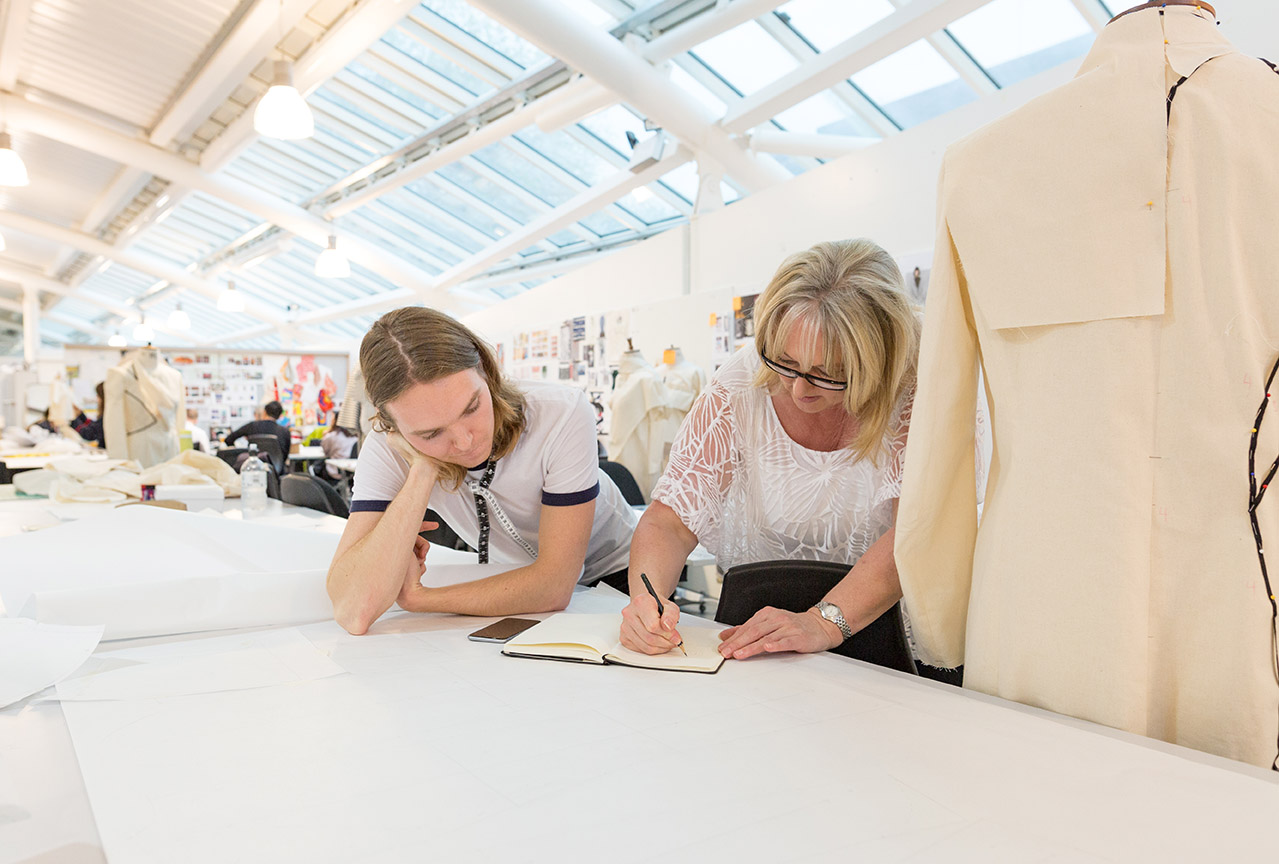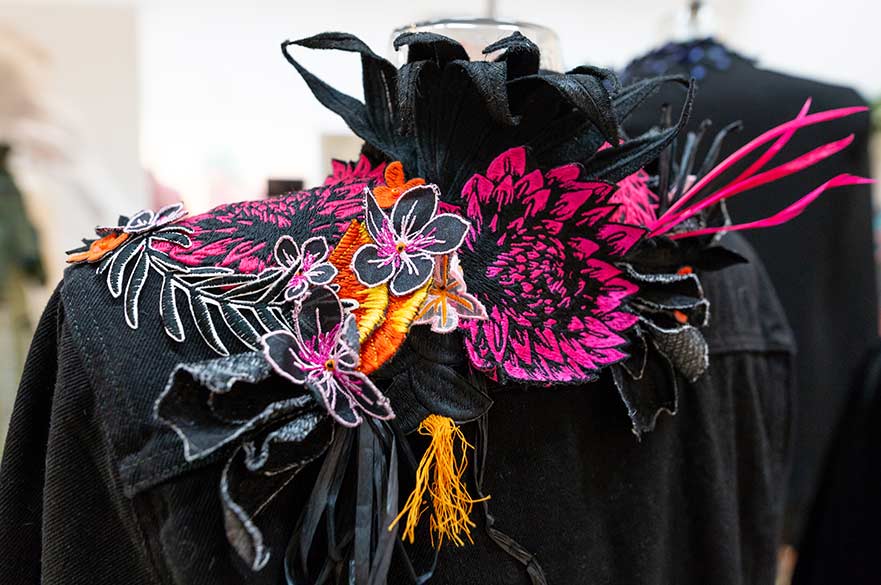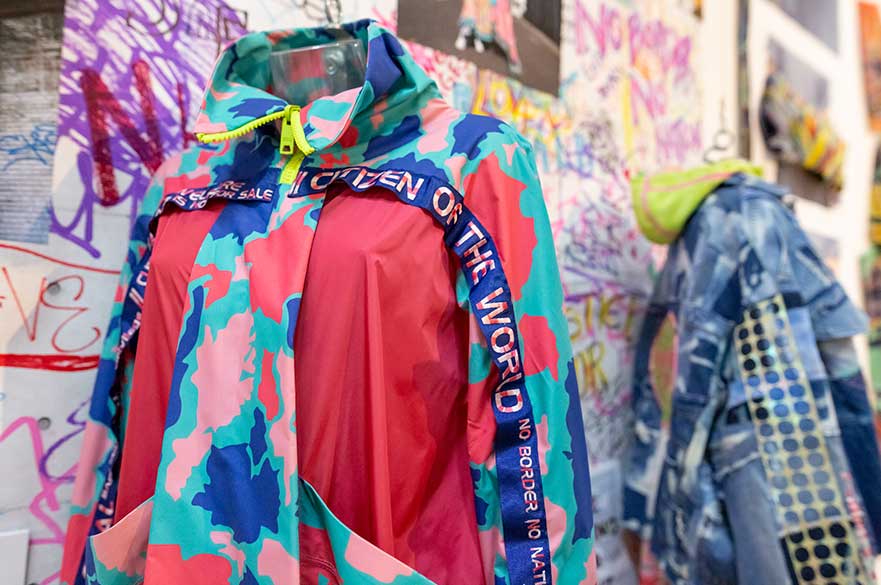Fashion and Textiles MA
About this course
This specialist, flexible part-time course provides the opportunity for you to explore and develop your own specialism within Fashion, Textiles or Knitwear Design.
Our MA Fashion, Textiles and Knitwear courses provide a platform for diverse and creative thinking and design practice to challenge and drive the future of fashion and textiles.
This will be your opportunity to think and do creatively, as be agents of change, to be innovative, take risks, to explore and solve problems.
We encourage a personalised approach to practice and theory that takes account of social, political, environmental, and technological issues, from local and global perspectives.
A critical approach to notions of progress encouraging a deeper understanding of craft, traditional and digital practices, and wider technological developments.
What you’ll study
The modular structure of this course provides opportunities for cross-school community building, interdisciplinary thinking and collaboration.
The optional modules provide a bespoke learning experience geared towards individual professional futures.
Innovation in Practice
(140 credit points)
This module is designed to fully support flexibility and personalisation. Running throughout the course, it enables part-time students to negotiate and manage their time allocation to the module while completing the School-wide Collaboration and Culture module in term 1 and making a personal decision to study their optional module in year 1.
Culture and Collaboration
(20 credit points)
In this module you will explore themes of ‘Cultural Emergency’ in collaboration with those from other MA disciplines. It will provide you with a fresh insight into your practice, develop advanced research methods and help you define and explore wider possibilities in your practice in interdisciplinary ways.
Term Two
Optional modules:
Professional Futures
(20 credit points)
This optional module will be an exciting space to investigate and develop thoughts around the future of what employment looks like in the area of Fashion and Textiles. It will be a vehicle for debate and a catalyst for cross disciplinary opportunities in relation to employment, enterprise and innovations.
You will be delivering a presentation that summarises your findings from a series of short self-initiated activities that could include work placement opportunities, liaising with industry, industry visits and networking opportunities, developing skills and knowledge of new and emerging digital technologies, and how it impacts your own practice and career ambitions and possibilities.
*optional modules can be studied in Yr1 or Yr2 for PT study.
Advancing Research Design
(20 credit points)
An opportunity to develop current postgraduate work through the use of applied research methods as part of a cross-discipline community.
You will explore and critique a range of research methodologies and methods to examine how these can be applied in support of creating coherent research design, and the development of robust outcomes across diverse disciplines.
Extend knowledge of research methods and methodologies to enhance future professional practice; or progression to PhD level study.
*optional modules can be studied in Yr1 or Yr2 for PT study.
Innovation in Practice
(140 credit points)
This module is designed to fully support flexibility and personalisation. Running throughout the course, it enables part-time students to negotiate and manage their time allocation to the module while completing the School-wide Collaboration and Culture module in term 1 and making a personal decision on whether to study their optional module in year 2
Culture and Collaboration
(20 credit points)
In this module you will explore themes of ‘Cultural Emergency’ in collaboration with those from other MA disciplines. It will provide you with a fresh insight into your practice, develop advanced research methods and help you define and explore wider possibilities in your practice in interdisciplinary ways.
Term Five
Optional modules:
Professional Futures
(20 credit points)
This optional module will be an exciting space to investigate and develop thoughts around the future of what employment looks like in the area of Fashion and Textiles. It will be a vehicle for debate and a catalyst for cross disciplinary opportunities in relation to employment, enterprise and innovations.
You will be delivering a presentation that summarises your findings from a series of short self-initiated activities that could include work placement opportunities, liaising with industry, industry visits and networking opportunities, developing skills and knowledge of new and emerging digital technologies, and how it impacts your own practice and career ambitions and possibilities.
*optional modules can be studied in Yr1 or Yr2 for PT study.
Advancing Research Design
(20 credit points)
An opportunity to develop current postgraduate work through the use of applied research methods as part of a cross-discipline community.
You will explore and critique a range of research methodologies and methods to examine how these can be applied in support of creating coherent research design, and the development of robust outcomes across diverse disciplines.
Extend knowledge of research methods and methodologies to enhance future professional practice; or progression to PhD level study.
*optional modules can be studied in Yr1 or Yr2 for PT study.
We regularly review and update our course content based on student and employer feedback, ensuring that all of our courses remain current and relevant. This may result in changes to module content or module availability in future years.
Don’t just take our word for it, hear from our students themselves
Student Work
Video Gallery
How you're taught
Teaching and learning experiences will include:
- lectures
- tutorials
- seminars
- inductions
- workshops
- live projects
- study visits
- self-directed research
- independent studio practice.
Find out when our postgraduate term dates for the Nottingham School of Art & Design are. Please note that these are slightly different to other Schools within the University.
How you're assessed
Assessment is 100% by coursework and involves:
- Project Proposal
- supporting fashion research and development work
- evidence of reflective practice
- experimental designs
- formal presentation of key developments
- resolved fashion/ textile / knitwear designs
- portfolio and CV.
Careers and employability
This course leads to a wide range of career opportunities including commercial or independent fashion, textile or knitwear designer, maker or artist.
Other industry-related roles include buyer, merchandiser, production manager, trend forecaster, and styling for fashion and knitwear companies and brands.
You could also use this course to support a career in teaching, lecturing, journalism and progression to MPhil or PhD study.
Recent graduates have set up their own successful businesses, and work within the fashion and textile design sector and wider creative industries. Others have returned to their previous job with a renewed focus and enhanced career prospects.
If you are interested in starting your own creative business, the University provides start-up training and support through NTU Enterprise, our centre for entrepreneurship and enterprise.
Professional practice
If relevant to your project you will have the option to organise and undertake internships, learn entrepreneurship skills through business development courses and attend events held by the University's Employability team and other organisations.
You will also be encouraged to undertake research into fashion, textile or knitwear design companies, or appropriate contexts, for retailing or showcasing your completed project.
You will be invited to collaborate in projects and attend research events and symposia. Recent exhibitions our students have been involved in include:
- Crafting Anatomies
- Knitting Nottingham
- Closely Held Secrets
- DE NATURA; and
- Journeys in Lace: Parts 1 & 2 (Lace: Here: Now).
Study trips
Study visits to exhibitions in London have recently included:
- The Fashion World of Jean Paul Gaultier at the Barbican; and
- ARTIST TEXTILES Picasso to Warhol at the Fashion and Textile Museum.
An optional annual trip to Antwerp and Paris has included visits to:
- Dries Van Noten - Inspirations
- Happy Birthday Dear Academie!
- Madame Grès: Sculptural Fashion.
During this trip student have also visited:
- Première Vision (incorporating Indigo and Yarntex)
- MatériO
- Li Edelkoort's Trend Union studio.
You will also be invited to submit your work to be considered for exhibition at London's New Designers.
Showcase
Explore our showcase ‘We Are Creatives’ - celebrating the work of the Nottingham School of Art & Design students. You will find a sneak peak of some of our students’ work and gain a real insight into what it’s like to be part of the NTU creative community at wearecreativesntu.art
YouFirst – working with our Employability Team
Our friendly, experienced careers consultants will work closely with you at every stage of your career planning, providing personal support and advice you won't find in a book or on the internet. You can benefit from this at any time during your studies and up to three years after completing your course.
Re:search Re:imagined
To us, research is about more than writing papers and proposing new ideas. By daring to think differently, we’re disrupting the research landscape and finding the answers to the questions that really matter. From electronic textiles to the history of lace, we’re inspiring the brightest minds to rise up and find solutions to some of the most significant global challenges facing society.
Find out more: ntu.ac.uk/research
Campus and facilities
Our dedicated postgraduate Fashion Design studio is a lively, highly creative environment based in the Bonington building, a dedicated art and design hub. You can view all of our Fashion facilities on the Nottingham School of Art & Design Facilities page.
Entry requirements
UK students
Academic entry requirements: 2.2 honours degree in a related subject.
Other requirements: a creative portfolio.
Additional requirements for UK students
There are no additional requirements for this course.
Other qualifications and experience
We welcome applications from students with non-standard qualifications and learning backgrounds and work experience. We consider credit transfer, vocational and professional qualifications, and any work or life experience you may have.
You can view our Recognition of Prior Learning and Credit Transfer Policy which outlines the process and options available, such as recognising experiential learning and credit transfer.
Getting in touch
If you need more help or information, get in touch through our enquiry form.
International students
Academic entry requirements: Bachelors degree grade 2.2 or equivalent qualification. We accept equivalent qualifications from all over the world. Please check your international entry requirements by country.
Other requirements: a creative portfolio.
English language requirements: See our English language requirements page for requirements for your subject and information on alternative tests and Pre-sessional English.
Additional requirements for international students
There are no additional requirements for this course.
English language requirements
View our English language requirements for all courses, including alternative English language tests and country qualifications accepted by the University.
If you need help achieving the language requirements, we offer a Pre-Sessional English for Academic Purposes course on our City campus which is an intensive preparation course for academic study at NTU.
Other qualifications and experience
We welcome applications from students with non-standard qualifications and learning backgrounds and work experience. We consider credit transfer, vocational and professional qualifications, and any work or life experience you may have.
You can view our Recognition of Prior Learning and Credit Transfer Policy which outlines the process and options available, such as recognising experiential learning and credit transfer.
Sign up for emails
Sign up to receive regular emails from the International Office. You'll hear about our news, scholarships and any upcoming events in your country with our expert regional teams.
Getting in touch
If you need advice about studying at NTU as an international student or how to apply, our international webpages are a great place to start. If you have any questions about your study options, your international qualifications, experience, grades or other results, please get in touch through our enquiry form. Our international teams are highly experienced in answering queries from students all over the world.
Policies
We strive to make our admissions procedures as fair and clear as possible. To find out more about how we make offers, visit our admissions policies page.














